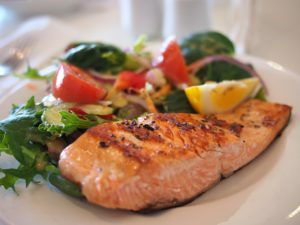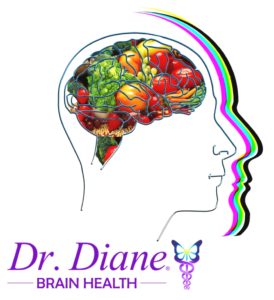Protein for Brain Health
Optimizing Brain Health – The Importance of Proteins
Today, I want to focus on the critical role that proteins play in any beneficial nutrition program including programs for optimizing brain health. In recent years there has been an abundance of low-grain diets developed by medical doctors and nutritionists promoting the benefits of increased proteins and their positive impact on a number of diseases. More than 40 years of clinical research shows that low-grain diets can help us feel better; live longer; help prevent cancer, diabetes, heart disease, and obesity; as well as increase strength, endurance, muscle mass, and optimize our brain health.
To better understand why these diets have been so successful I am providing a few keys facts upon which these diets are based. For further detail on this subject, two useful and informative books are Protein Power, by Doctors Michael Eades and Mary Dan Eades (1996, Creative Paradox, LLC.) and Life Without Bread, by Doctors Christian Allan and Wolfgang Lutz (2000, Keats Publishing).
The Importance of Protein in your Diet
 Protein is a “macronutrient” and a component of every cell in our bodies. We require large amounts of protein to maintain our health. Protein is used in our bodies to build and repair tissue and to make enzymes, hormones, and other body chemicals. Our immune system is working 24/7 to protect us against viruses, bad bacteria and the growth of cancer cells. The antibodies our body requires to perform this vital function are made up of proteins.
Protein is a “macronutrient” and a component of every cell in our bodies. We require large amounts of protein to maintain our health. Protein is used in our bodies to build and repair tissue and to make enzymes, hormones, and other body chemicals. Our immune system is working 24/7 to protect us against viruses, bad bacteria and the growth of cancer cells. The antibodies our body requires to perform this vital function are made up of proteins.
Protein comes from many different sources, including meat, fish, eggs, soy, milk, beans, legumes, and nuts. When proteins are digested, they leave behind amino acids, which the human body needs to break down food. A complete protein (or whole protein) is a source of protein that contains an adequate proportion of all of the essential amino acids necessary for our dietary needs.
There are eight essential amino acids that are the components of the proteins mandatory in a healthy diet: valine, lysine, threonine, leucine, isoleucine, tryptophan, phenylalanine, and methionine. The body does not store essential amino acids so we must eat them every day. If we do not get all eight essential amino acids together in the same meal the body will just break them down for energy instead of building proteins for repair and growth. Getting all eight together is most easily accomplished by eating animal meat, fish and animal products (eggs, milk, cheese).
Arachidonic acid is not one of the essential fatty acids but it is high in red meat and egg yolk and some people are sensitive to it. To help reduce the level of arachidonic acid in your diet choose meat from grass fed animals which have lower levels than those in animals that are fed in feedlots. Grilling meats also reduces arachidonic acid because it is in the meat fat which drips out during grilling.
How much Protein do we Need?
In order to determine how much COMPLETE protein we require each day, use the following formula:
Divide your body weight in pounds by 2.2.
Then multiply that number by 0.8.
The resulting number gives you the number of grams of protein you need each day for proper overall body health maintenance and brain optimization. There are situations in which an individual will need more protein. These situations include sickness, healing from an injury, pregnancy, bodybuilding or increased athletic performance.
Protein Facts
- Building body parts requires protein for repair and growth.
- All cell activity is supported by enzymes which are made up of proteins.
- Brain cells can multiply for better thinking if we eat protein and the healthy kinds of saturated fats (e.g. coconut oil, palm oil, egg yolks, avocados, lard).
- Hormones are proteins and therefore hormone balance is dependent upon proper protein balance.
- Proteins help reduce blood pressure.
- Proteins reduce triglycerides.
- Proteins reduce fatigue.
- Proteins reduce the risk of ischemic heart disease, the local deficiency of blood supply produced by vasoconstriction or local obstacles to the arterial flow.
Protein for Health
Proteins are brain optimizing foods that are essential for getting nutrients to your brain cells in order to maintain a healthy heart/brain balance, and also brain regulation. Just as there are brain-boosting foods, there are also foods that prevent your brain from optimal functioning. These include foods and beverages that contain sugar and other artificial or highly processed ingredients. If you want to feel and perform your best, it is important to include foods that improve overall body and brain function, and exclude foods that worsen those functions.
The following are some recommended sources of protein:
| Serving Size | Grams of Protein | |
| Yogurt | 1 cup | 14g |
| Lentils | 1 cup | 18g |
| Shrimp* | 4 ounces | 30g |
| Salmon (Wild, Sockeye)* | 4 ounces | 30g |
| Chicken | 4 ounces | 34g |
| Turkey | 4 ounces | 33g |
| Tuna* | 4 ounces | 34g |
| Cashews | 1/4 cup | 5g |
| Walnuts* | 1/4 cup | 4g |
| Sunflower seeds | 1/4 cup | 8.5g |
| Almonds | 1/4 cup | 7.5g |
| Avocado | 1 cup | 3g |
* Indicates foods rich in Omega 3’s. Omega 3’s have anti-inflammatory properties and are beneficial for ADD/ADHD, Stroke, Lyme Disease, Brain Injury, Arthritis, Fibromyalgia and more.
 For an idea of what foods complete a healthy, balanced brain diet, see what’s cooking under Dr. Diane’s® Brain Health Recipes.
For an idea of what foods complete a healthy, balanced brain diet, see what’s cooking under Dr. Diane’s® Brain Health Recipes.
Martha Lindsay MS, CNE, Certified GAPS practitioner is a member of Dr. Diane Roberts Stoler’s integrative team of brain health experts with a Master’s degree in Microbiology and Public Health from Michigan State University and certifications in Whole Health Nutrition Education, and GAPS diet. She helps clients develop a nutrition plan that optimizes both brain health and overall health. She holds an advanced clinical certification in Nutrition Response TestingSM, a muscle testing technique which is used to choose the most appropriate specific nutrition products for each individual. The specific nutritional program she develops for each client enhances that individual’s immune system function which then helps their brain and body to function more efficiently.
Whether you are recovering from a concussion or brain injury, getting your brain optimized to function at its peak level, or optimizing your overall health, Martha can work with you to set individualized nutrition plans to help you achieve your goals through diet.
To feel and perform better, schedule an appointment with Martha today! Please call 800-500-9971 or submit an online contact form.



I think the most important information I can cull from this article is the following:
There are eight essential amino acids that are the components of the proteins mandatory in a healthy diet: valine, lysine, threonine, leucine, isoleucine, tryptophan, phenylalanine, and methionine. The body does not store essential amino acids so we must eat them every day. If we do not get all eight essential amino acids together in the same meal the body will just break them down for energy instead of building proteins for repair and growth. Getting all eight together is most easily accomplished by eating animal meat, fish and animal products (eggs, milk, cheese).
There are times I work with students who’ve had a concussion or traumatic brain injury. I would gladly share this article with their parents. I also find it fascinating; it gives me a new outlook on my protein consumption.
Thank you for your comment Maryann! Check out my book, Coping with Concussion and Mild Traumatic Brain Injury too and please share with the students/parents dealing with concussion and traumatic brain injury. There are lots of practical suggestions for treating the various symptoms, including diet and nutrition. Diet and nutrition play a key role in treating brain injury, yet is often overlooked my medical doctors.
Here’s to your health!
-Dr. Diane
Love this article. Great little addition of the anti inflammatory foods which is what all patients require after a brain injury. I wonder which foods do you consider inflammatory and therefore best to be avoided?
Hi Bill,
Best to avoid processed foods, trans fats, refined sugar, refined grains, alcohol, artificial sweeteners, and more. I do offer brain health diet consults.. In a consult, I evaluate your current diet and develop a customized nutrition plan based on your needs and goals. For more see: https://www.drdiane.com/brain-health-diet-consult/
Thank you!
Excellent information! `Don’t forget to include that protein requirements increase with activity. The numbers given appear to be for the average, fairly sedentary person. Extremely active people can require upwards of one gram of protein per pound of bodyweight per day! Most of us fall somewhere in between. Also, some amino acids are “conditionally essential,” in that our diets can sometimes provide enough, but not always. Glutamine, for instance, is required in greater amounts than we can generally get from our diets when we are under greater levels of stress.
What about histidine as an essential amino acid?
Hello Annette,
Thank you for commenting! Histidine is also an essential amino acid, thank you for pointing that out.
Hope this helps. There is a Way!